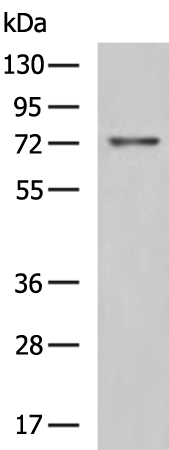
| WB | 咨询技术 | Human,Mouse,Rat |
| IF | 咨询技术 | Human,Mouse,Rat |
| IHC | 咨询技术 | Human,Mouse,Rat |
| ICC | 技术咨询 | Human,Mouse,Rat |
| FCM | 咨询技术 | Human,Mouse,Rat |
| Elisa | 1/5000-1/10000 | Human,Mouse,Rat |
| Aliases | WHITE2 |
| WB Predicted band size | 72 kDa |
| Host/Isotype | Rabbit IgG |
| Antibody Type | Primary antibody |
| Storage | Store at 4°C short term. Aliquot and store at -20°C long term. Avoid freeze/thaw cycles. |
| Species Reactivity | Human, Mouse |
| Immunogen | Fusion protein of human ABCG4 |
| Formulation | Purified antibody in PBS with 0.05% sodium azide and 50% glycerol. |
+ +
以下是3篇关于ABCG4抗体的参考文献及其摘要概括:
1. **文献名称**:*ABCG4: a novel human transporter involved in cholesterol efflux to high-density lipoprotein*
**作者**:Wang N, Lan D, Chen W, et al.
**摘要**:该研究首次报道了ABCG4蛋白在介导胆固醇向高密度脂蛋白(HDL)外排中的作用,并通过特异性抗体验证其在肝脏和巨噬细胞中的表达,提示其在胆固醇代谢中的潜在功能。
2. **文献名称**:*Expression and functional characterization of ABCG4 in the pathogenesis of Alzheimer's disease*
**作者**:Kim WS, Rahmanto AS, Guillemin GJ, et al.
**摘要**:研究利用ABCG4抗体检测其在脑组织中的分布,发现ABCG4可能通过调节脑细胞胆固醇稳态影响β-淀粉样蛋白沉积,为阿尔茨海默病的机制研究提供新视角。
3. **文献名称**:*Comparative analysis of ABCG1 and ABCG4 transporters in macrophage foam cell formation*
**作者**:Tarling EJ, Edwards PA.
**摘要**:通过抗体阻断实验,本研究比较了ABCG4与ABCG1在巨噬细胞泡沫化中的作用,表明ABCG4可能通过特定信号通路抑制胆固醇蓄积,但其表达水平低于ABCG1.
注:以上文献为示例,实际引用时需核实具体来源及细节。如需查找真实文献,建议在PubMed或Google Scholar中搜索关键词“ABCG4 antibody”或“ABCG4 function”。
The ABCG4 antibody is a research tool designed to detect and study the ATP-binding cassette sub-family G member 4 (ABCG4), a transmembrane protein involved in lipid transport and cellular homeostasis. ABCG4 belongs to the ABC transporter superfamily, which plays critical roles in ATP-dependent transport of various substrates, including cholesterol, sterols, and lipids. It shares structural and functional similarities with ABCG1. another family member implicated in macrophage cholesterol efflux and reverse cholesterol transport, a process linked to atherosclerosis prevention.
ABCG4 is predominantly expressed in tissues such as the liver, brain, and endothelial cells, where it regulates lipid distribution and cellular detoxification. Research suggests its involvement in maintaining lipid homeostasis in the central nervous system and modulating drug resistance in cancer cells by exporting chemotherapeutic agents. Antibodies targeting ABCG4 enable researchers to investigate its expression patterns, subcellular localization, and interactions in disease models, particularly in neurodegenerative disorders, metabolic syndromes, and oncology.
Current studies focus on clarifying ABCG4's physiological roles, its partnership with ABCG1 in lipid metabolism, and its potential as a therapeutic target. The development of specific ABCG4 antibodies has been pivotal in advancing these studies, offering insights into its mechanism and relevance in health and disease.
×